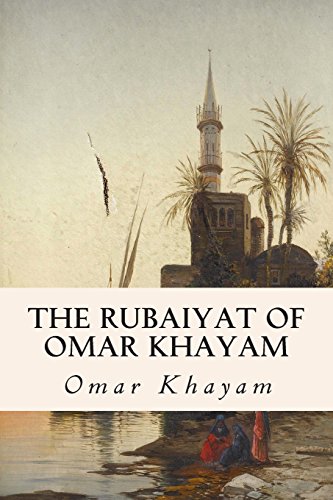Reseña del editor:
Rubáiyát of Omar Khayyám is the title that Edward FitzGerald gave to his 1859 translation of a selection of quatrains (attributed to Omar Khayyam (1048–1131), dubbed "the Astronomer-Poet of Persia". FitzGerald's work at first was unsuccessful, but was popularised by Whitley Stokes from 1861 onward, and the work came to be greatly admired by the Pre-Raphaelites. In 1872 FitzGerald had a third edition printed which increased interest in the work in America. By the 1880s, the book was extremely well known throughout the English-speaking world, to the extent of the formation of numerous "Omar Khayyam Clubs" and a "fin de siècle cult of the Rubaiyat". FitzGerald's work has been published in several hundred editions, and it has inspired similar translation efforts both in English and in many other languages. The authenticity of the poetry attributed to Omar Khayyam is highly uncertain. Omar was famous during his lifetime not as a poet but as an astronomer and mathematician. The earliest reference to his having written poetry is found in his biography by al-Isfahani, written 43 years after his death. This view is reinforced by other medieval historians such as Shahrazuri (1201) and Al-Qifti (1255). Parts of the Rubaiyat appear as incidental quotations from Omar in early works of biography and in anthologies. These include works of Razi (ca. 1160-1210), Daya (1230), Juvayni (ca. 1226-1283), and Jajarmi (1340).[2]:92[3]:434 Also, five quatrains assigned to Khayyam in somewhat later sources appear in Zahiri Samarqandi's Sindbad-Nameh (before 1160) without attribution.[4]:34 The number of quatrains attributed to him in more recent collections varies from about 1,200 (according to Saeed Nafisi) to more than 2,000. Skeptic scholars point out that the entire tradition may be pseudepigraphic.[4]:11 The extant manuscripts containing collections attributed to Omar are much too late to enable a reconstruction of a body of authentic verses. Iranian scholars, notably Mohammad-Ali Foroughi, in the 1930s attempted to reconstruct a core of authentic verses from scattered quotes by authors of the 13th and 14th centries, ignoring the younger manuscript tradition. After World War II, reconstruction efforts were significantly delayed by two clever forgeries. De Blois (2004) is pessimistic, suggesting that contemporary scholarship has not advanced beyond the situation of the 1930s, when Hans Heinrich Schaeder commented that the name of Omar Khayyam "is to be struck out from the history of Persian literature". A feature of the more recent collections is the lack of linguistic homogeneity and continuity of ideas. Sadegh Hedayat commented that "if a man had lived for a hundred years and had changed his religion, philosophy, and beliefs twice a day, he could scarcely have given expression to such a range of ideas".[4]:34 Hedayat's final verdict was that 14 quatrains could be attributed to Khayyam with certainty.[6] Various tests have been employed to reduce the quatrains attributable to Omar to about 100.[3]:434 Arthur Christensen states that "of more than 1,200 ruba'is known to be ascribed to Omar, only 121 could be regarded as reasonably authentic".663 Foroughi accepts 178 quatrains as authentic, while Ali Dashti accepts 36 of them. The extreme popularity of FitzGerald's work led to a prolonged debate on the correct interpretation of the philosophy behind the poems. FitzGerald emphasized the religious skepticism he found in Omar Khayyam.[10] In his preface to the Rubáiyát, he describes Omar's philosophy as Epicurean and claims that Omar was "hated and dreaded by the Sufis, whose practice he ridiculed and whose faith amounts to little more than his own, when stripped of the Mysticism and formal recognition of Islamism under which Omar would not hide."[11] Richard Nelson Frye also emphasizes that Khayyam was despised by a number of prominent contemporary Sufis.
Biografía del autor:
Edward Fitzgerald (1809 83) was an English poet and philosopher. His is the first and most famous translation of Omar Khayyam s "The Rubaiyat."
„Über diesen Titel“ kann sich auf eine andere Ausgabe dieses Titels beziehen.


